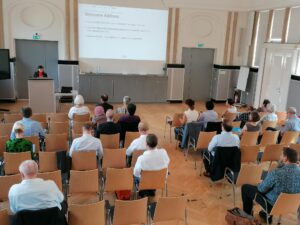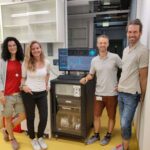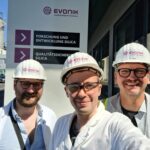The “international network initiative on safe and sustainable nanotechnology” (INISS-Nano) as an internationalization initiative of the EU NanoSafetyCluster (NSC) and the Asia Nano Forum (ANF), but open to participants around the world, co-organized this annual globally open communication event.
Core topic of the 6th Dialogue was “The role of characterization and how it is addressed in INISS-Nano”. The location was inspired by the content: one of the leading metrology institutes, the Physikalisch-Technische Bundesanstalt (PTB) in Berlin. The German Ministry of Environment (BMUV), specifically Anke Jesse and her team, hosted the event as local organizer, back-to-back with their international conference.
The program included presentations from Asian and European experts, spanning from collaboration success stories, insights into the characterization competences around the globe, the envisaged next steps towards improved knowledge/data exchange, quality data and towards global collaboration opportunities.
Furthermore, in the breakout groups the session chairs and rapporteurs did a great job moderating their respective group to discuss the progress of the actions planned in the respective INISS-Nano pillar. Actions have been reviewed, modified and prioritized, new ideas generated, and ways forward discussed in four groups.
Download the AGENDA , EU-Asia Booklet and Wrap-Up.
Download Presentations:
on the left picture: Anita Breyer, Director-General of Chemical Safety, Emission Control and Transport at the German Federal Ministry for the Environment, Nature Conservation, Nuclear Safety and Consumer Protection
in the middle picture: Wannee Chinsirikul, President of Asia Nano Forum (ANF) 2022-2023, Executive Director of National Nanotechnology Center, Thailand
Partners from several EU- and/or nationally funded projects (e.g., SABYDOMA, HARMLESS, DIAGONAL, NanoPAT, IRISS, NanoSyn4, PARC, etc.) related to SSbD actively contributed to the successful dialogue in different roles: participants, presenters, break out group chairs and rapporteurs, etc. Furthermore, the audience included all relevant stakeholders: civil society/press, government, academia, industry, research, NGOs. Thus, the event was great for all the mentioned projects (i) to get insights into global developments in the field of characterisation and beyond, (ii) to bring in their expertise to jointly discuss the different approaches towards S(S)bD-implementation, and (iii) to further increase the impact of each projects’ efforts by understanding and thus better addressing the needs of relevant stakeholders.




